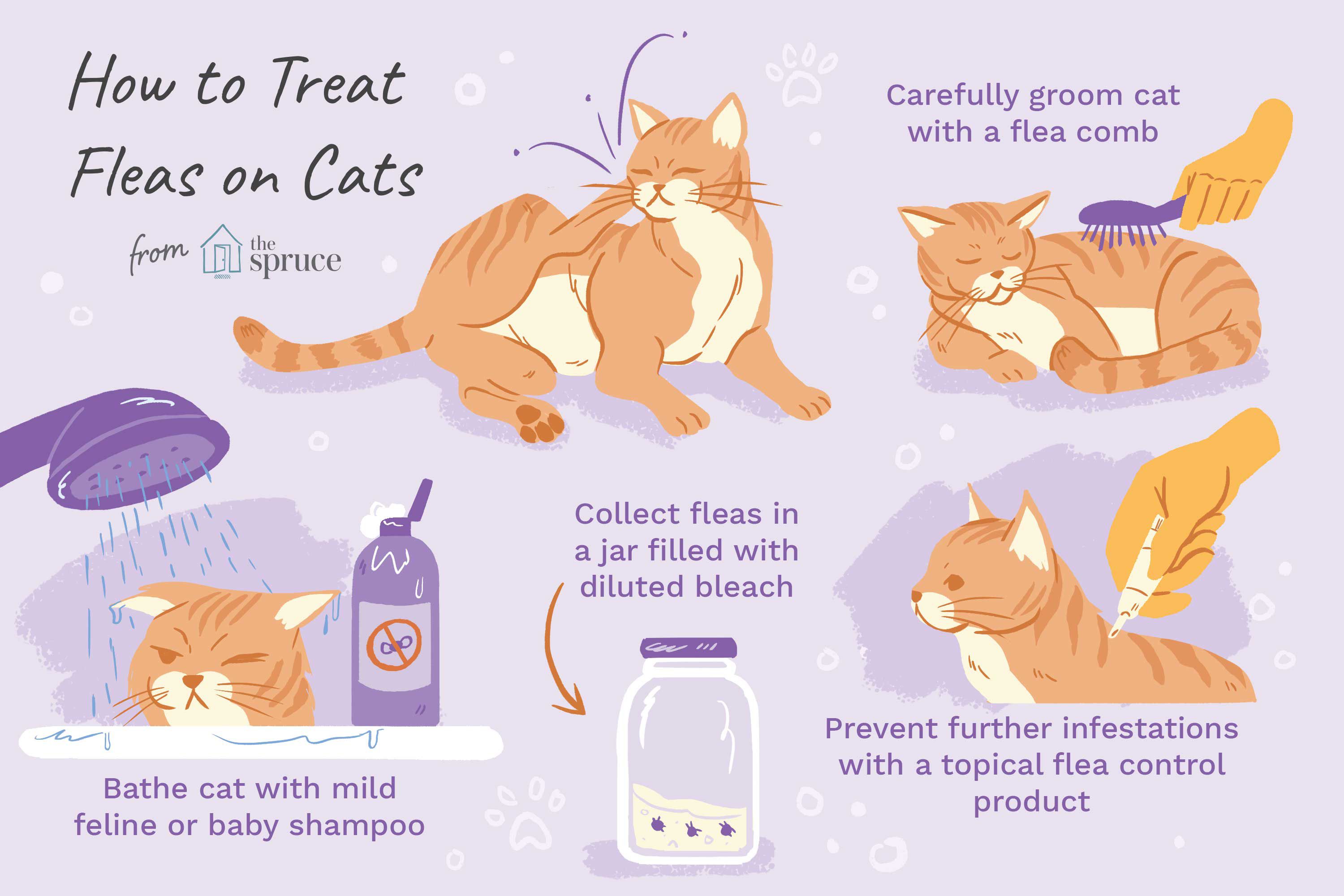In the daily life of cat owners, applying home remedies for treating fleas in cats is no small challenge. Fleas and ticks not only make cats uncomfortable but also pose a risk of spreading diseases. Especially in kittens with weaker immune systems, preventing and treating parasites becomes more necessary than ever

How Do Fleas and Ticks Spread in Cats?
Cat fleas not only disturb pets but also pose a threat to their health. Particularly in humid and hot conditions like those in Vietnam, fleas thrive, parasitizing on cats and sucking their blood. Each female can lay thousands of eggs in a lifecycle of about 50 days. Therefore, implementing home remedies for flea control as soon as possible is essential.
Flea and Tick Lifecycle in Cats
- Egg Stage: Eggs develop into larvae within a few days.
- Larval Stage: Larvae feed on organic debris.
- Pupal Stage: Transition from larvae to adult fleas.
- Adult Stage: Adult fleas begin mating and laying eggs.
Weather Effects on Flea and Tick Development
- Spring and Summer: The flea lifecycle shortens to just 17-40 days, allowing for rapid reproduction. By late summer, the lifecycle can extend to two months or longer.
- Winter: Flea development slows down, with larvae potentially residing for up to 10 months.
- Humidity: A humid environment supports the development of flea eggs into mature larvae.
How to Identify Fleas and Ticks in Cats
Fleas and ticks are common parasites in kittens, causing significant discomfort and illness. Here are some signs to help you identify if your cat has fleas, so you can apply the appropriate flea control methods:
- Constant Itching: Kittens with fleas often show signs of itching due to allergic reactions to flea saliva. This can lead to continuous biting or licking of their fur.
- Biting Their Legs and Tail: Another sign is frequent biting of their back legs, especially around the tail and thighs.
- Red or Black Spots on the Body: If you notice red or black spots on your cat's body, it may be flea feces. This is a sign to take immediate action to treat fleas.
- Severe Allergies: Some kittens may have severe allergic reactions to flea saliva, leading to swelling.
Depending on chemical reactions and other cellular responses, allergic skin reactions and signs of fleas in kittens can appear immediately or after 24-48 hours. Therefore, it’s crucial to find flea control methods as soon as you notice these signs.
Why Is Treating Fleas in Cats Important?
Fleas and ticks are external parasites that primarily survive by sucking blood from cats. Although they only leave small bites, their saliva contains allergens that can pose serious health risks to cats. The damage fleas and ticks can cause includes:
- Allergies: Flea bites can cause dermatitis, anemia, itching, inflammation, and infections.
- Infections and Abscesses: Ticks can cause infections and abscesses, and in some cases, can lead to paralysis or death.
- Disease Transmission: Both fleas and ticks can transmit various dangerous diseases, including Lyme disease, Anaplasmosis, Bartonellosis, Rocky Mountain Spotted Fever, tapeworms, and Babesiosis.
- Transmission to Humans: While cats are less susceptible to tick-borne diseases than dogs, they can still contract and transmit certain diseases to humans, particularly zoonotic infections.
Preventing fleas and ticks not only reduces the risk of allergic reactions and illnesses caused by parasites in cats but also helps prevent disease transmission from cats to humans. Careful maintenance and prevention will keep your beloved cat healthy and safe.
Home Remedies for Treating Fleas in Cats
Fleas and ticks not only cause inconvenience but also affect the health of kittens. Here are some simple methods to detect and treat fleas at home:
- Grooming and Manual Removal: Use specialized grooming combs frequently to help detect fleas and ticks early and remove them from your cat's fur. Fleas and ticks often hide in dark corners and the cat's bedding. Clean your cat’s living environment thoroughly to prevent the spread.
- Disinfectant Sprays: Disinfectant sprays can kill bacteria and parasites, protecting your cat’s living environment from disease spread.
- Bathing with Specialized Shampoo: Choose a cat-specific shampoo recommended by veterinarians to effectively remove fleas and ticks. Avoid using cold water to prevent lowering body temperature and causing respiratory issues.
- Using Lemon Solution: Prepare a lemon solution and spray it on your cat after bathing and grooming to help eliminate fleas without harming your pet.
- Using Peppermint Essential Oil: Dilute peppermint essential oil, then use a cotton swab to apply the mixture to areas affected by flea bites, helping to eliminate bacteria and clean damaged skin.
These methods should be applied regularly and consistently for the best results. Ensure that your cat does not come into contact with other infected cats to prevent re-infestation. These home remedies for flea control are effective and safe for kittens. Regular care and hygiene will ensure your cat stays healthy and free from parasites.
Recommended Flea Treatments for Cats
Fleas and ticks not only disturb pets but also impact their health. When choosing preventive flea medications, it's important to understand the type of parasite you want to control:
- Right Product Type: Choose a product suitable for cats, combining diverse protective abilities.
- Consideration Before Use: Always consult a veterinarian before selecting a product.
- Follow Usage Instructions: Read the instructions carefully, especially when treating kittens, elderly cats, or pregnant or nursing cats.
- Monitor Your Cat After Treatment: Observe your cat after using flea treatments for any adverse reactions.
- Address Any Reactions: If unusual signs appear, wash your cat thoroughly and consult a veterinarian.
Choosing the right option depends on your cat’s specific characteristics and needs. In temperate to moderate weather, protecting pets is essential, especially in warm climates. Here’s a list of recommended flea treatments for cats:
Spot-on Flea Treatments for Cats
- MERIAL Frontline Plus: One of the most popular spot-on products on the market, effective for preventing and treating fleas, ticks, and lice. It works by breaking the flea lifecycle, preventing egg development.
- Advantage II: Known for its rapid flea-killing ability, effective in controlling fleas. This product is safe for cats over 8 weeks old and can prevent re-infestation for several weeks.
- Revolution (Selamectin): Effective against fleas and ticks as well as certain intestinal worms and heartworms. This is an excellent option if you want a versatile product to protect your pet.
Flea Shampoo for Cats
Before using any flea shampoo for cats, ensure you read the instructions carefully and check if it suits your cat's specific condition. If your cat has any skin issues or health concerns, consult your veterinarian before choosing a flea shampoo.
- BBN Killing Mites Shampoo: This product is a great choice for cats with sensitive skin and helps effectively address skin issues such as fungal, bacterial infections, and fleas. Notably, the formula contains Pectin to restore coat vitality.
- BIOLINE Insect Repellent Shampoo: This is the perfect solution for protecting against ticks, fleas, and other harmful insects. This product is formulated with gentle ingredients, including natural Margosa extract, which helps reduce skin irritation while nourishing the cat’s coat for softness and shine.
- TROPICLEAN Natural Flea Tick Dog Shampoo: Made from natural ingredients like peppermint oil and sesame oil, this product not only eliminates fleas and ticks but also ensures safety.
- Veterinary Formula Clinical Care Flea and Tick Shampoo: This is a good choice for cats with sensitive skin. The product not only kills fleas and ticks but also helps soothe the skin and reduce inflammation.
- Adams Plus Flea & Tick Shampoo: Provides dual action by killing insects and preventing the development of eggs and larvae. The strength of this product lies in containing Precor, an insect growth regulator.
- Natural Chemistry De Flea Pet Shampoo: A good option for those wanting to use natural products. This shampoo uses plant-based ingredients to kill fleas without harming the cat.
- Sentry PurrScriptions Plus Flea & Tick Shampoo: Offers a powerful formula that helps eliminate both fleas and ticks. It also contains moisturizing ingredients to protect the cat’s skin and coat.
Cat Flea Treatment Sprays
- JOYCE & DOLLS Intensive Disinfectant: Quickly helps eliminate various types of fleas, bacteria, and pathogens in the living environment of cats.
- MERIAL Frontline Spray Treatment: Effectively kills fleas and ticks while preventing the development of eggs and larvae.
- VET’S BEST Flea and Tick Home Spray: Made from natural ingredients like peppermint oil, safe for both cats and humans.
- Seresto Flea and Tick Spray: Rapidly kills fleas and prevents re-infestation.
- Natural Chemistry Flea and Tick Spray: A natural product that is safe for both cats and humans.
Flea Collars for Cats
- Magic Herbal Collar For Cat: Effectively protects against fleas and ticks, safe for kittens.
- BIOLINE Flea Tick Collar: Has a natural fragrance that protects cats from ticks and various insects.
- Seresto Flea and Tick Collar for Cats: Prevents ticks and fleas for up to 8 months and is waterproof.
- BAYER Animal Health Seresto Collar: Specially designed to fit various types of cats.
- Adams Flea and Tick Collar for Cats: Lasts for 6 months, safe for kittens 12 weeks and older.
- Fleadom Virbac: Provides continuous protection against ticks and fleas.
Ear Mite Treatment for Cats
- Revolution: Treats ear mites and other parasites, including ear ticks.
- Advocate: A comprehensive solution for ear mites and other parasites.
- Otomax: An antibiotic, anti-inflammatory, and steroid-containing medication that helps treat ear infections.
- Tresaderm: Specifically treats ear infections caused by mites and fungi.
- Virbac Epi-Otic Advanced Ear Cleanser: Cleans cat ears and prevents ear infections.
Treatments for Mites on Humans
- Permethrin Cream: Used to treat and prevent mites and fleas, but should be consulted with a doctor before using on small children or pregnant women.
- Hydrocortisone Cream or Lotion: Helps reduce inflammation and itching, soothing irritated skin caused by cat mites.
- Benzyl Benzoate Cream: Can be used as directed by a doctor to kill mites.








